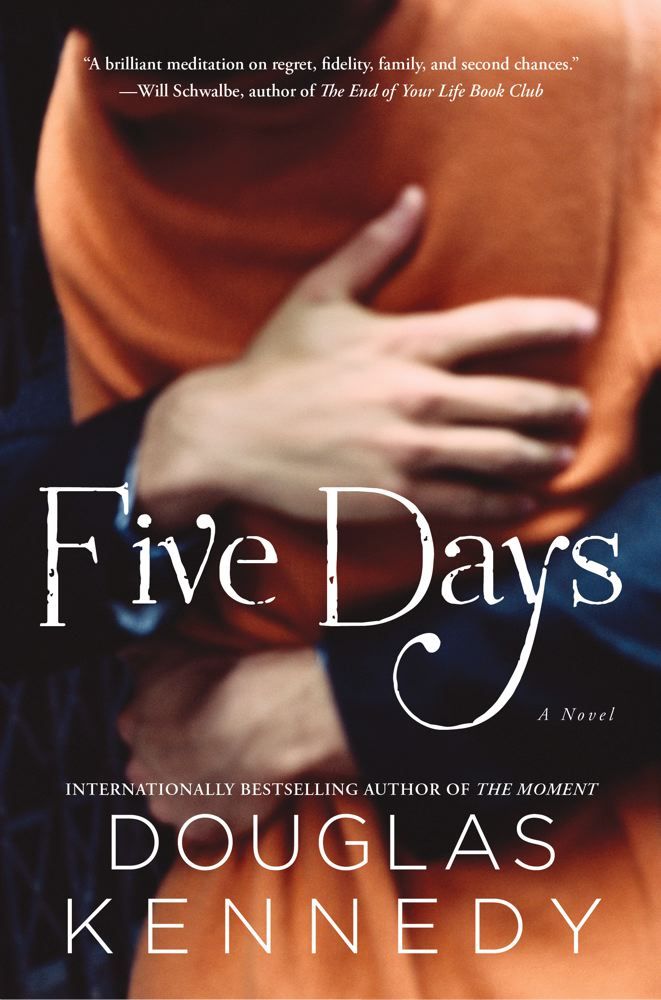Laura Warren is a radiologist in a small coastal Maine hospital. Always overjoyed when cancer isn’t found in her patients, she lives a quiet life of metastasized grief and regret that she hides from everyone, especially her husband, Dan, and Ben and Sally, her teenage son and daughter.
Bright, extremely well read and a native Mainer to the core, Laura responds to a woman in her book group when she asks why so many writers use the sea as a metaphor.
“Maybe it’s because, when you’re by the sea, life doesn’t seem so limited. You’re looking out at infinite possibilities,” Laura says.
To which the woman responds: “And the biggest possibility of them all is the possibility of escape.”
Sometime Maine resident Douglas Kennedy’s newest novel, “Five Days,” delves exquisitely and painfully into how it is that people allow themselves to live lives of such tightly “limited horizons.”
Once a girl of big dreams, of living in Paris with the love of her life, Laura has settled for a loveless marriage with a man with whom she shares few interests, who belittles her love of books and the use of “big words,” who wounds her daily with the bitter frustration of losing his job and being without work for 18 months.
When Laura’s boss senses her frazzled despair, he gives up his plans to attend a three-day radiologist conference in Boston so she can go instead, hopefully to recharge herself.
By happenstance, Laura finds herself standing in a long check-in line at the conference hotel engaged in conversation with a “drab, gray man”: An insurance salesman from Bath, Richard Copeland.
Later that evening when she goes alone to Cambridge for dinner and then to catch “The Searchers,” an old John Wayne movie, at the Brattle Theatre, the salesman shows up just as the lights go down and takes a seat in the nearly empty theater, “dropping in the row in front of me.”
After the movie, when they run into one another in the lobby, Laura, seeing that Richard’s eyes are also red from crying over the movie’s sad ending, finds herself curiously interested in the life of this stranger.
In the hands of a novelist of less deft skills, a reader might find this plot development predictable and trite. And despite sensing that a match-up is inevitable, Douglas manages to pull the reader deeper into the story with surprising revelations about these greatly kindred spirits.
Laura discovers that Richard lives, like herself, a rich inner life, loving words and books and film.
The dialogue between them over a glass of wine — witty and erudite, challenging and sharply insightful — is superbly crafted. Although much of the dialogue is without identifiers for who is speaking, it doesn’t matter. It’s like listening to twins.
The book is one of the richest explorations of character pathos that I’ve read recently. Both Laura and Richard are flawed, vulnerable, damaged and lonely. Both want more — without knowing exactly what “more” is.
Kennedy maps the geography of how what once gives joy can become twisted into barriers that block and nullify desire.
Both Laura and Richard reveal the current angst of their existences, then travel deeper to voice tragic, painful losses that still haunt each of them.
The author painstakingly builds the link between present and past, with what’s in the middle like life suspended between two bridge towers — the dream of what might have been, and the hopeless reconciling existence of now.
At one point, Laura asks of Richard if the tragedy of her past hadn’t happened, “would the entire course of my life have been different? Would I feel loved? Would I be happy?”
A paradoxical question forever easily asked, typically fraught with regret and anguish, it is also one that remains forever impossible to answer.
The taut, spellbinding verisimilitude that builds to that question slackens on the way to the denouement of their relationship. But Laura’s life is indelibly altered, and again, very believably so.
“Five Days” is a story — finally — about how we might all, to some degree, be prisoners of our pasts. But also that we always have the power to choose whether we settle for “limited horizons” — or escape into new possibilities.
Frank O Smith is a Maine writer, ghostwriter, writing coach and teacher whose novel, “Dream Singer,” was a finalist for the Bellwether Prize. He can be reached at: www.thewritinggroup.com
Send questions/comments to the editors.



Comments are no longer available on this story